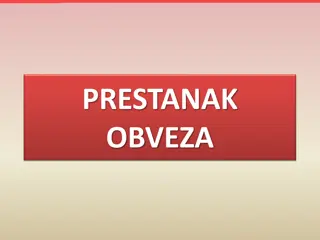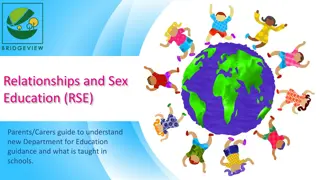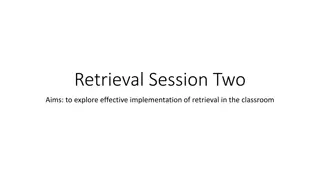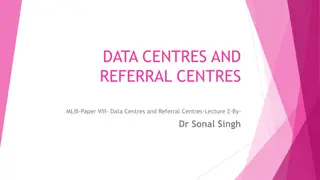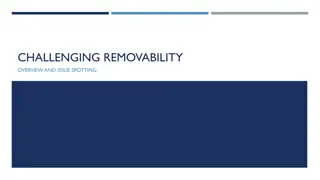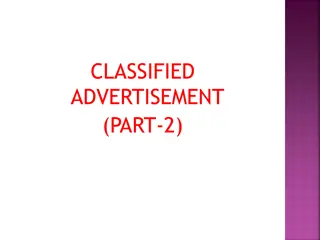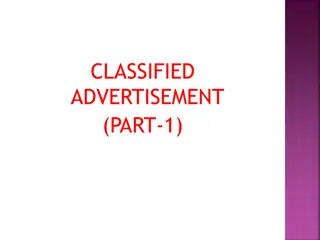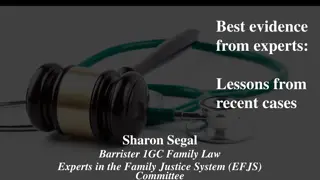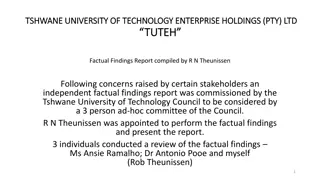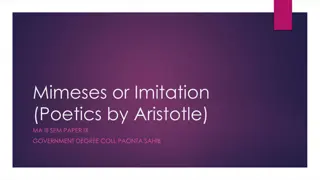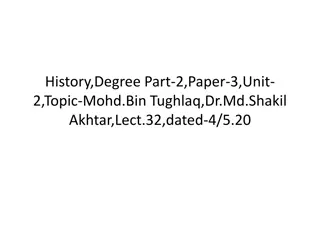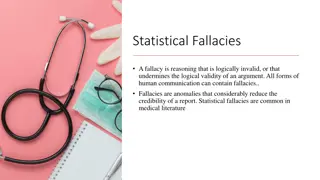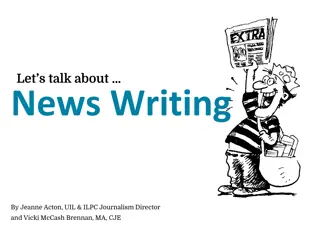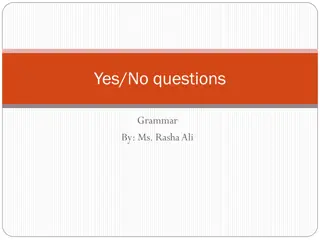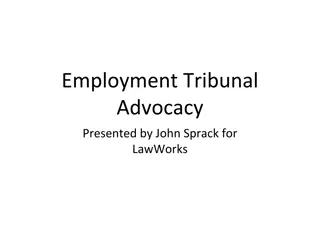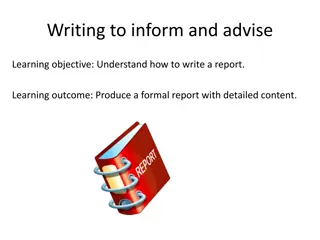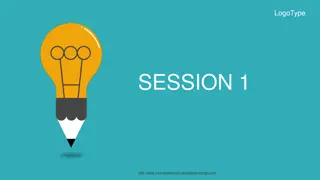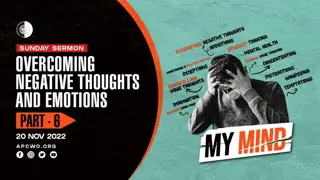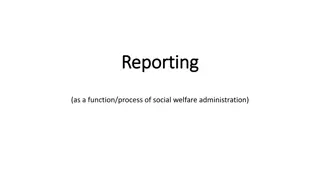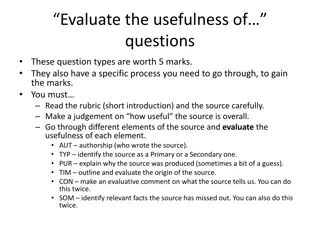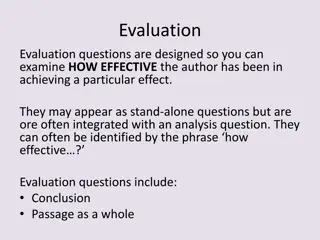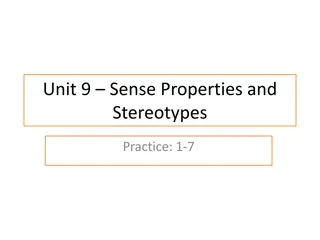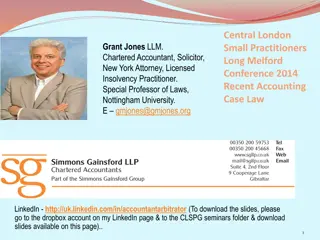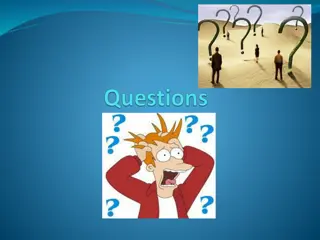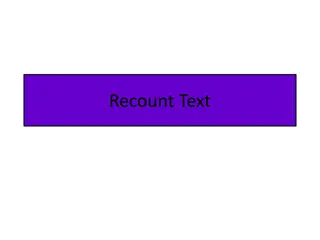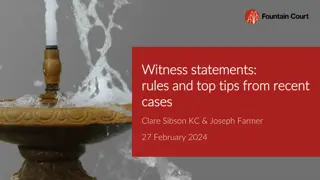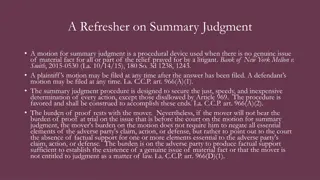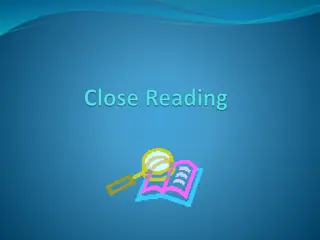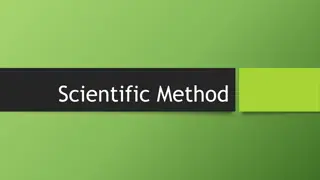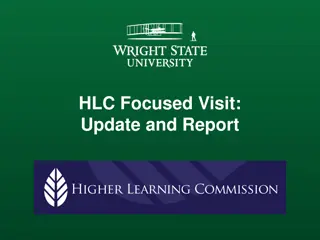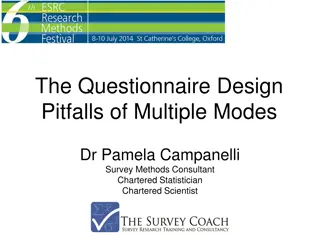Understanding Termination of Obligations in Civil Law
Termination of obligations can occur voluntarily through legal agreements or involuntarily through factual occurrences. There are two main types of termination: by the will of the parties (such as legal transactions) and independently of the parties' will (due to certain legal facts). The cessation
3 views • 25 slides
Understanding Facts and Opinions in Reading Comprehension
Reading comprehension involves distinguishing between facts and opinions in a text. Facts can be objectively proven, while opinions are subjective reflections of personal feelings. Recognizing the difference is crucial for essay writing and critical analysis. By examining cues and asking specific qu
2 views • 9 slides
Understanding Relationships and Sex Education (RSE) Guidance for Parents/Carers
Personal, Social, Health and Economic Education (PSHE) plays a crucial role in promoting positive attitudes towards health and wellbeing for children. At Bridgeview Special School, children are taught about relationships through age-appropriate lessons using the Jigsaw program. Parents/carers are en
1 views • 18 slides
Effective Implementation of Retrieval in the Classroom
Explore the implementation of retrieval practice in the classroom through quizzes and feedback to enhance learning. Understand key concepts like the testing effect, Ebbinghaus forgetting curve, spacing, and schemas. Avoid common pitfalls such as focusing on factual recall only, providing easy questi
1 views • 11 slides
Understanding Data Centres and Referral Centres in Information Institutions
Society's evolution from an agricultural to a knowledge-based society has led to the transformation of information institutions like libraries, documentation centres, and data centres. Data centres play a crucial role in gathering, processing, and disseminating data for various human progress activi
6 views • 42 slides
Understanding Burden of Proof in Removal Proceedings
This material provides an overview of challenging removability issues, burden of proof on removal charges, and key aspects related to Notice to Appear (NTA) and factual allegations in immigration cases. It discusses who holds the burden of proof in different scenarios, such as arriving aliens and th
1 views • 16 slides
Effective Strategies for Classified Advertisements - Tips and Examples
Classified advertisements serve as public notices for services, property buying/selling, and more. They follow a simple and formal format with essential tips to consider when creating one. The characteristics of a classified ad include factual content, concise language, and key details. Different ty
1 views • 10 slides
Understanding Classified Advertisements for Effective Communication
Classified advertisements play a vital role in conveying information on services, property sales, missing items, and more. They are characterized by simplicity, factual content, and a formal structure, with essential details provided concisely. Follow important tips like clear categorization and con
1 views • 11 slides
Expert Evidence in the Family Justice System: Lessons from Recent Cases
Lessons from recent cases highlight the pivotal role of expert evidence in family law proceedings. Judicial findings emphasize the importance of a factual substratum supporting abuse allegations. Courts rely on expert testimony but judges ultimately decide based on the evidence presented. The releva
0 views • 17 slides
Tshwane University of Technology Enterprise Holdings Report
An independent factual findings report was compiled by R.N. Theunissen in response to concerns raised by stakeholders regarding Tshwane University of Technology Enterprise Holdings. The report, finalized in June 2020, covers methodology, findings, and recommendations, highlighting issues such as the
0 views • 6 slides
The Theory of Mimesis in Aristotle's Poetics
Aristotle's theory of mimesis, outlined in his work "Poetics," contrasts with Plato's view by emphasizing that art imitates nature. He believes that poetry expresses the universal while history narrates the particular, highlighting the poet's freedom from factual constraints to explore larger truths
0 views • 12 slides
Revenue Reforms and Taxation Policies of Muhammad bin Tughlaq
Muhammad bin Tughlaq, known for his wisdom, implemented bold reformative measures in his rule. He initiated revenue reforms by assessing the country's income and expenditure through the compilation of province-wise registers. However, his decisions, such as increasing taxation in the fertile Doab re
0 views • 12 slides
Understanding and Avoiding Statistical Fallacies in Medical Literature
Statistical fallacies, which can significantly reduce the credibility of reports, are common in medical literature. These fallacies often arise from issues with sample problems, inadequate analysis techniques, errors in presentation of findings, and misinterpretation of statistical results. Maintain
0 views • 7 slides
Understanding Ethics: Foundations and Principles
Ethics, a cornerstone of human behavior, encompasses descriptive, normative, and meta ethical aspects. It delves into the nature of ethics, its definition, and the essence of ethical judgment. Ethics evaluates conduct against moral ideals, aiming to guide moral judgments and actions with regard to t
0 views • 6 slides
Mastering News Writing Structure for Effective Journalism
Dive into the world of news writing with insights from Jeanne Acton and Vicki McCash Brennan. Explore the essential elements of news structure, learn about different models like the Inverted Pyramid and Wall Street Journal format, and discover how to engage readers effectively with factual informati
0 views • 37 slides
Understanding Yes/No Questions in English Grammar
Yes/No questions in English grammar are essential for communication. These questions have two basic types - Yes/No questions and Wh-questions. Yes/No questions, also known as closed questions, have only two possible responses - Yes or No. To form a Yes/No question, verbs like BE, DO, HAVE, or modal
0 views • 9 slides
Strategies for Effective Tribunal Advocacy in Employment Cases
Practical guidance on preparing for and presenting a case at an Employment Tribunal, covering disputed legal and factual issues, persuasion tactics, witness preparation, dealing with opposing witnesses, hearing procedures, and effective questioning techniques, all illustrated with images for better
0 views • 17 slides
Writing a Formal Report: Understanding and Advising
Reports are essential documents for conveying factual information, aiding in decision-making processes, and guiding actions. To write a proficient report, it is crucial to use formal language, maintain the correct format, present clear information, and ensure proper grammar and punctuation. Understa
4 views • 7 slides
Enhancing Language Skills Through Wh-Questions Workshop
This workshop focuses on developing language skills through the use of wh-questions. Participants engage in pair work, individual activities, and a presentation to practice asking and answering personal questions. The session includes activities such as writing personal questions, answering question
1 views • 8 slides
Overcoming Negative Thoughts and Emotions Through Biblical Guidance
Explore how negative thoughts and emotions impact us and learn to counter them with Biblical truths. Discover ways to be factual without negativity, guard against self-deception, and apply scriptures like Romans 12:3 and Galatians 6:3 for a healthier mindset. Find strategies to overcome fear and dep
1 views • 39 slides
Importance of Reporting in Social Welfare Administration
Reports play a crucial role in social welfare administration by summarizing agency services, aiding in coordination, and facilitating evaluation. Proper report writing helps disseminate factual information, enhance communication between departments, and inform the community about agency activities.
0 views • 6 slides
Evaluation of Source Usefulness through Multiple Criteria
In this evaluation task, you will assess the effectiveness of questions based on various criteria such as authorship, type of source, purpose, and relevance of information. By carefully analyzing the source content and rubric, you will provide an overall judgment on the source's utility while evalua
3 views • 10 slides
Exploring Creative Nonfiction: A Comprehensive Guide
Creative nonfiction blends literary elements with factual storytelling, aiming to captivate readers with intriguing narratives. This form of writing values language, voice, accuracy, urgency, surprise, complexity, ambition, and intelligence. Writers of creative nonfiction craft pieces such as litera
1 views • 11 slides
Understanding Online Journalism: Definition, Characteristics, and Types
Online journalism encompasses various forms of media based on telecommunication and multimedia, such as websites, online radio, and TV. It involves the convergence of sound, image, and text to provide factual, contextual, and subdivided content. This type of journalism is not confined to news writin
0 views • 31 slides
Analysis of Evaluation and Conclusion Questions in Textual Analysis
Evaluation and Conclusion questions play a crucial role in assessing the effectiveness of an author in achieving specific effects and summarizing key points in a passage. These types of questions are commonly found in textual analysis tasks to evaluate the success of conveying ideas and themes. Eval
0 views • 9 slides
Mastering the Essay Writing Process: From Research to a Strong Opinion Statement
Navigate the process of crafting a compelling essay step-by-step – from selecting a topic and forming a strong opinion statement to supporting your argument with factual reasons and evidence. Learn how to structure your essay effectively, culminating in a powerful thesis statement that reflects yo
0 views • 25 slides
Understanding Meaning and Communication
Diving into the nuances of language and communication, this content explores concepts like two-place predicates, referents, and hard cores of meaning. It delves into the challenges of distinguishing between factual and semantic questions and emphasizes the importance of agreeing on word meanings for
0 views • 28 slides
Transformation of Exclamatory Sentences to Assertive: Rules and Examples
Learn how to transform exclamatory sentences into assertive sentences with clear rules and examples. Find out how to change the tone from enthusiastic or emotional to more straightforward and factual.
0 views • 11 slides
Recent Accounting Case Law: Oraki v. Bramston (2014)
Appeal against Deputy Master Julia Clark's decision on the application to strike out Particulars of Claim and amend it in the case of Oraki and another v. Bramston and another in 2014. The case involves negligence allegations against chartered accountants and licensed insolvency practitioners regard
1 views • 41 slides
Understanding Different Types of Questions and Short Answers in English Grammar
This content covers various question forms in English grammar, including general questions, special questions, alternative questions, tag questions, direct and indirect questions, yes-no questions, and short answers. It explains the structure and usage of each type of question with helpful examples
1 views • 24 slides
Understanding Recount Text Structures and Features
Recount text is used to retell events in chronological order and describe what happened. It can include various text types like letters, diaries, newspaper articles, biographies, and more. Different structures such as factual recount, historical recount, and personal recount provide a framework for
0 views • 17 slides
Understanding Witness Statements: Rules and Best Practices
Witness statements play a crucial role in legal proceedings, and it's essential to grasp the rules governing human memory, the scope of witness evidence, and the content required in such statements. Human memory is dynamic and susceptible to influences, emphasizing the need for accurate and reliable
0 views • 20 slides
Understanding Summary Judgment in Louisiana Courts
Summary judgment is a procedure in Louisiana courts used to resolve legal matters efficiently when there is no genuine issue of material fact. The burden of proof lies with the moving party, who must show the absence of factual support for essential elements of the opposing party's claim. Required d
0 views • 29 slides
Understanding Wrongful Convictions: Research, Criteria, and Policy Interventions
The Preventing Wrongful Convictions Project delves into the factors leading to erroneous convictions, exploring research questions, case criteria, organizational assistance, and case selection methodologies. Focusing on factual innocence, the project aims to identify near misses and provide insights
0 views • 18 slides
Close Reading Techniques for Better Comprehension
Learn how to effectively tackle close reading passages by mastering two types of questions: factual questions and context questions. Explore examples and steps to improve your understanding and interpretation skills. Enhance your ability to extract key information, translate it into your own words,
0 views • 70 slides
Practice and Procedure in Judicial Review: Factual Evidence and Interveners
The content provides valuable insights into the practice and procedure regarding factual evidence and interveners in judicial review cases. It covers general rules, recent cases, applications for oral evidence, questioning witnesses, opinion evidence, and the role of interveners. Key points include
0 views • 28 slides
Understanding the Scientific Method and Its Application in Science
Science, derived from the Latin word for knowledge, is a blend of reasoning and factual information. It hinges on observation, experimentation, and the quest for natural explanations. There are no absolute truths in science; our comprehension of nature stems from observation. Two primary scientific
0 views • 27 slides
Focused Visit Update and Report Overview
This update provides insights into a focused visit report progress, challenges, transparency, and expectations. It emphasizes the importance of evidence-based arguments, addressing challenges, and restoring compliance. The report outlines specific meetings with various stakeholders, questions from t
0 views • 13 slides
Pitfalls of Multiple Modes in Questionnaire Design by Dr. Pamela Campanelli
The research discusses challenges in questionnaire design when using multiple modes, such as sensitivity to question content and mode effects. Recommendations are provided to address issues related to sensitive questions, factual versus subjective inquiries, and positivity bias in Telephone (TEL) an
0 views • 62 slides
Effective Implementation of Retrieval in Classroom Settings
Explore the testing effect, Ebbinghaus forgetting curve, spacing, and schema in implementing retrieval practices in the classroom. Learn about pitfalls to avoid, such as focusing solely on factual recall, providing too easy questions, and lack of feedback. Discover the Hyper-correction Effect and th
0 views • 11 slides
